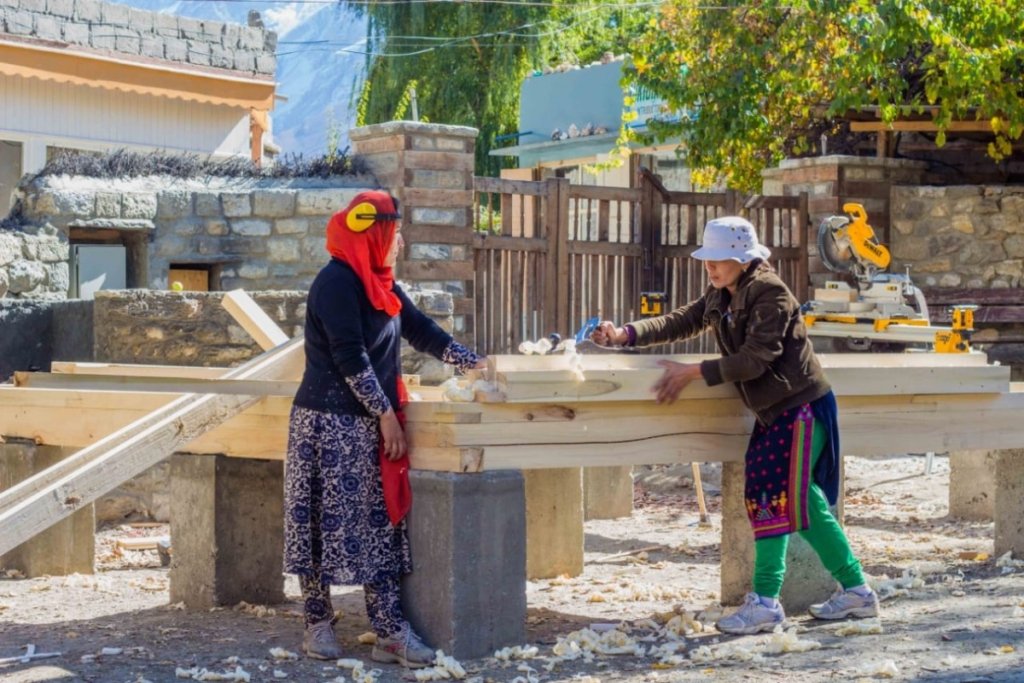Have you ever imagined progress of a society, or a nation without women? To answer this question, let us confine it to our homes. What troubles do we face in the absence of our moms and sisters? They are nuclous in every family and society. When the nuclous breaks the entire system collapses. So how can we imagine overcoming issues like global warming, conflict, disasters, and other crises without the role of women.
Women are more vulnerable to natural and man-made disasters and economic crises then men as they are the one who bear the brunt of these crises the most. Hence they become resilient and stronger then men; they have better skills of managing dwindling resources like water, food items, energy in a situation of crisis. However, they are not given equal space in decision-making proccess. This disparity limits women’s ability to adapt to the impacts of climate change. They are perceived as victims rather than making them active and effective agents of mitigation and adaptation strategies of climate-induced risks.
The power differences and gender inequalities limit the participation of women in politics, governance, employment, and decision-making. We need to understand that these inequalities and power cnflicts are not divine but created by our own intuitions, ourselves. This exacerbates our vulnerabilities to various natural and human-induced disasters.
Many of the researches indicate that gender inequalities undermine the achievements of the MDGs that means that the SDGs will meet the same challenges if we do not make substantial changes in our behaviours and make policies inclusive in all sectors.
In Pakistan, women contribute up to 65pc of the agricultural workforce, responsible for more labour-intensive tasks that are conducted manually. Despite their huge role in everyday life women have negligible participation in decision-making processes and limited access and control of environmental goods and services. In the ‘Global Gender Gap Report 2021’ published by the World Economic Forum (WEF), Pakistan ranked 153rd out of 156 countries on the gender parity index. The gender gap has raised by 0.7pc points in 2021 compared to 2020.
Pakistan ranked seventh among eight countries in South Asia, only one point above Afghanistan.
The presence of women in senior roles is even rarer making just 4.9pc in Pakistan. The share of women ministers has decreased from 12pc to 10.7pc. The income of an average woman is below 16pc of that of an average man, while in Nepal and Bhutan the gap is lower than 50pc, as the income earned by a woman is 74pc and 58pc, respectively, of that of a man.
Studies show that women are more vulnerable to climate change than men. The UN figures indicate that 80pc of the people displaced by climate change are women. The pandemic also posed a serious impact on the women where 5pc of the employed women lost their jobs as compared to 3.9pc of the men globally.
It is alarming that the most vulnerable sect is excluded from the process of rewinding the damage that men have done to the ecosystem. It is not possible to achieve the sustainable development goals (SDGs) and implement the Ecosystem Restoration strategies without women who constitute 48. Pc of the total population of the country.
The underrepresentation of women in decision-making and other leading roles is a global phenomenon. For example, the underrepresentation of women’s senior leadership in COPs (one of the major events on climate changes) has been raised as an issue of concern by activists. The main goal of COP26 is to secure a global net-zero and keep 1.5 degrees within reach. Reports show that 45pc of the Cop26 unit are now women but their roles are inclined to event organizing and serving as advisors rather than the core team members. Men take the major public-facing roles. The Oxfam report shows that only 28pc of the women share their voices about climate change in a news article.
Ecosystem restoration and rewinding the damages done to the “Earth” and “Atmosphere” is not an easy task and it will be more difficult and time-consuming if women remained neglected in the process. It needs unbiased approaches and, can be achieved only when global efforts are made purely for the cause. Power politics, security crisis, gender inequalities giving weightage to economic gains, and compromising the environmental concerns will aggravate our vulnerabilities to climate change-induced disasters.
The government should include women in the process of ecosystem restoration. Pakistan’s green initiatives will remain incomplete without the inclusion of women in these initiatives. Since they are playing labour-intensive roles in every sector of life, they should be at the key positions of decision-making at local, regional, and national levels. It is the obligation of the government to provide modern education, job opportunities, health facilities, a secure and enabling environment, to women in the country.

Ali Rahmat is an environmental and social activist. He works for SDPI, an Islamabad-based leading think tank. He can be reached at: aligojali2020@gmail.com

